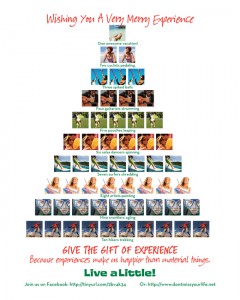[caption id="attachment_4869" align="pull-left" width="240" caption="The Merry Experience card, available to give in lieu of gifts this Christmas."] [/caption]
[/caption]
Assistant Editor's Note: This post is a follow up to a previous article we ran about the Live A Little campaign being promoted by Joe Robinson, who is a previous ATTA Summit speaker and former publisher of the adventure magazine Escape.
Robinson says, "To help shift the national mood, I'm launching the Live A Little campaign, with partners including the Huffington Post, Experience Life magazine, and the Adventure Travel Trade Association. We're calling for activity providers across the nation to offer a free class -- yoga, dance, volleyball, climbing and more -- and for people to consider giving a recreational experience this holiday season. Visit the Live A Little page to find out how you can refer instructors and providers who can donate a class."
The campaign was recently featured in an article in the Huffington Post and is excerpted below.
We may have avoided an economic depression, but not a psychological one. Despair, helplessness and cynicism have the nation in a headlock, one that has pinned our resiliency to the mat. We are out of practice dealing with times like these, which haven't been seen since the Great Depression. We're particularly rusty at one of the best coping mechanisms for hard times, the last thing you'd probably think about right now: Recreation.Even in the Great Depression, which lasted a decade, it wasn't all gloom. People escaped their troubles in 25-cent movies, high school football games and barn dances... It was friends, family and the entertainment you participated in yourself, that got you through during the Depression -- and that still get you through the stresses and setbacks of life.
Researchers have amassed a mountain of evidence showing that we have a powerful source of resiliency right at our fingertips. Recreation buffers stressful events, increases optimism, builds self-esteem and confidence and increases social support -- all things we could use right now. As I detail in my new book on the power of participant experiences, "Don't Miss Your Life," the taboo realm of recreation is a potent engine of life satisfaction.
The University of Colorado's Leaf Van Boven has shown that experiences make us happier than material items, since they can't be compared to anyone else's experiences and form the positive memories that tell us we like our lives. Thomas DeLeire, at the University of Wisconsin, found that only one of the nine categories of consumption he measured was linked to an increase in happiness: leisure purchases. Recreation is so good at "re-creating" mindsets that there is a whole field of health devoted to it: recreation therapy, which builds self-worth and positive mood for people with disabilities, through activities such as horseback riding or wheelchair basketball.
We don't just need an economic recovery; we need a psychological one -- a national program of recreation therapy to lift spirits, restore our sense of competence and increase capacity for enjoyment, the proven outcomes of recreation participation. The research shows that leisure experiences are far from the trivial sideshow we think they are. They provide a critical line of defense against the setbacks of life; buffering stress and building self-determination and social connection, which satisfy core needs. Recreation is medicine, only a lot cheaper and more fun than the stuff at the drugstore. A dance class runs $10-$15 a week. It's $6 to play badminton at my neighborhood college. Most hikes and outings at your local Sierra Club chapter are free. There are a host of no or low-cost activities at city and county parks around the nation.
However, the article also details the American reality - as part of a national culture that places little value on vacation and leisure, and focuses personal identity on professional and economic success, Americans recreate far less than their global peers. Robinson calls for a return to the experiential this holiday season.
The recession and its endless aftermath have punched us in the gut, but we can start to climb out of the pit with experiences that counter the catastrophic thoughts cooked up by the caveman brain. The research is clear that positive experiences keep the anxiety at bay. The University of North Carolina's Barbara Frederickson has shown that it takes three positive events to every negative one to stay in the positive column, since negative emotions are so potent. Data from a wide variety of research shows that it is the cumulative effect of many small positive events that increases happiness.That's the role that recreation plays. You don't have to justify it. It's simply an essential ingredient for vital physical and mental health. This holiday season let's try something different and give the gift of living, with a recreational class or activity that can lift up a friend or family member. Give an engaging experience, which researchers say makes us happier than material things.
Our problems are huge, but we can find the energy and support to push through them when we're getting regular refueling. We don't have to stop living until everything is solved... Let's beat fear by stepping into the center of life, where we may find a silver lining in hard times -- a new understanding of where true value lies: in the friends, family and, yes, recreation that get us through. We may be down, but we're not out. We've got life.
Read the entire Huffington Post article.
Visit the Live a Little Facebook page.
